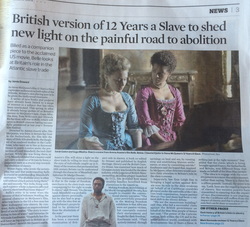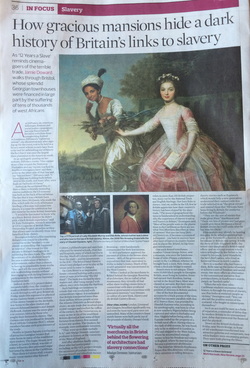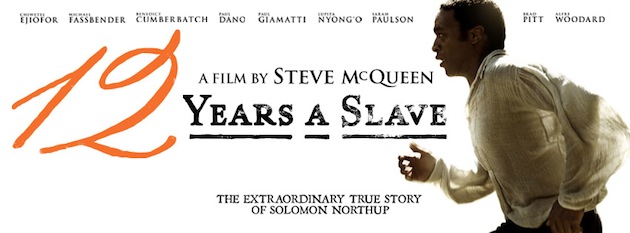Sky News: should Slavery be made essential reading?
I was only on air for 3 minutes, and there were a lot of other things I would have liked to say! The main points are:
1. In Britain, we need to think about the history of slavery from a British, not American perspective. Consider that Solomon Northrup was born a year after Britain abolished the slave trade in 1807. And that his British equivalents- men such as Olaudah Equiano, Ignatius Sancho and Ottobah Cuguano, who suffered slavery but found freedom and went on to campaign for abolition, published their books in the 1780s, some seventy years before the book 12 Years a Slave.
2. As I have argued before in the Guardian , in The Times, and on this blog, it is vital that slavery should not be allowed to dominate our impression of African history. We need to know that we have always been a nation of immigrants (Romans, Anglo-Saxons, Vikings, Huguenots...) and that Africans have been coming here since at least Roman times.
3. Education shouldn't stop at the school gates. Public institutions such as English Heritage and The National Trust in the heritage sector, museums and galleries such as the British Library, British Museum, National Gallery, and many other smaller organisations across the country all need to incorporate this history too. Not just for school visits (of which we need more), but for the general public too. Because, as George Santayana said: "Those who cannot remember the past are doomed to repeat it."
The Observer: Britain's links to slavery- News and In Focus

The story made page 3 of the Observer on Sunday- you can read Jamie Doward's full article here: British version of 12 Years a Slave to shed new light on the painful road to abolition- he led with the news that Amma Asante's film Belle will come to UK cinemas later this year -see trailer below.
I was quoted in the piece as saying: '[Belle's] story is interesting in lots of ways," said historian Dr Miranda Kaufmann. "Hopefully her film will have as big a splash in Britain as 12 years A Slave." Briefly, in 2007, Belle was the subject of a temporary exhibition at Kenwood House in 2007. Now she has been awarded a prominent and permanent presence.'
I also made the point that it's important to put the African individuals centre stage in these stories. As I told Doward, "Making Freedom, an exhibition at the Royal Geographical Society, has sought to counter the conventional slavery narrative." The point powerfully presented in the Making Freedom exhibition is that Africans were not passive victims, but constantly resisted their enslavement and fought for their freedom," Kaufmann said. "They actively resisted, through uprisings on land and sea, by running away and establishing Maroon settlements, or even by committing suicide." Kaufmann said she hoped that, inspired by McQueen, other directors would now turn their attention to Britain's role in the slave economy.
"Telling the stories of individuals is a better way into this subject," Kaufmann said. "If you just use lots of numbers and statistics, people put up the shutters."

Jamie Doward wrote a more in-depth piece for the In Focus section of the paper (p.36), which you can read here: How gracious mansions hide a dark history of Britain's links to slavery. The eagle-eyed among you will notice (as did various angry commenters) that the online version inserts "Bristol" into the headline, which draws focus from the role of Liverpool, London, Glasgow and many other British ports.
It was also a pleasure to be quoted alongside the wonderful historian
Dr. Madge Dresser, who I first met through my research for English Heritage back in 2007, and the brilliant Dr. Kate Donington, research associate at UCL's Legacies of British Slave-Ownership Project.
I was quoted as saying:
'The historian Miranda Kaufmann hopes that film directors will turn their attention to telling Britain's slavery stories such as Equiano's which would help a new generation understand their nation's role in a trade referred to as "the great circuit" and remind them that "Africans have been living in Britain for centuries before the Windrush".
"They are the sort of stories that make great films," Kaufmann said. "There are lots of pirates and bad guys. I could give Steve McQueen a list of British stories he could make after he has won his Oscar."
Film-makers may already be hearing this plea. Belle, which premiered last year at the Toronto film festival, is due for release in Britain this spring. It tells the story of Dido Elizabeth Belle, the mixed-race daughter of a British naval officer and an African woman who is taken to England by her father to be raised by his uncle, Lord Mansfield, the lord chief justice, who lived at Kenwood House in north London.
Born to a mother who had been a slave, Belle rose up the ranks of society to achieve a sort of freedom and social status. Her story offers an alternative to the conventional narrative that portrays slaves, in Kaufmann's words, simply as "herded cattle".'
My comments chimed with those of Kate Donington, whose words were so apposite that I think we can end on them:
' "I would be fascinated to know why as a black British director he didn't pick a black British experience." Donington believes a film examining Britain's role would be a healthy corrective to the "tendency to see slavery as something that happened in America".
"Often the only time Afro-Caribbean students encounter their history is through the prism of slavery, one that looks at enslaved people as victims," Donington said. "You can also tell the positive stories of the enslaved, of people of colour, who fought to emancipate themselves."'

 RSS Feed
RSS Feed
